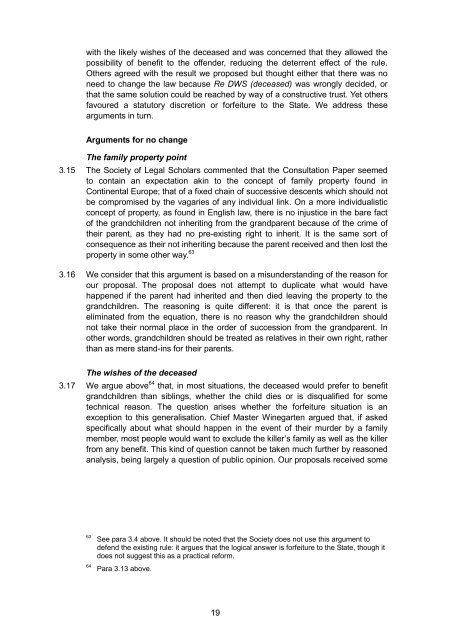The Forfeiture Rule and the Law of Succession ... - Law Commission
The Forfeiture Rule and the Law of Succession ... - Law Commission
The Forfeiture Rule and the Law of Succession ... - Law Commission
You also want an ePaper? Increase the reach of your titles
YUMPU automatically turns print PDFs into web optimized ePapers that Google loves.
with <strong>the</strong> likely wishes <strong>of</strong> <strong>the</strong> deceased <strong>and</strong> was concerned that <strong>the</strong>y allowed <strong>the</strong><br />
possibility <strong>of</strong> benefit to <strong>the</strong> <strong>of</strong>fender, reducing <strong>the</strong> deterrent effect <strong>of</strong> <strong>the</strong> rule.<br />
O<strong>the</strong>rs agreed with <strong>the</strong> result we proposed but thought ei<strong>the</strong>r that <strong>the</strong>re was no<br />
need to change <strong>the</strong> law because Re DWS (deceased) was wrongly decided, or<br />
that <strong>the</strong> same solution could be reached by way <strong>of</strong> a constructive trust. Yet o<strong>the</strong>rs<br />
favoured a statutory discretion or forfeiture to <strong>the</strong> State. We address <strong>the</strong>se<br />
arguments in turn.<br />
Arguments for no change<br />
<strong>The</strong> family property point<br />
3.15 <strong>The</strong> Society <strong>of</strong> Legal Scholars commented that <strong>the</strong> Consultation Paper seemed<br />
to contain an expectation akin to <strong>the</strong> concept <strong>of</strong> family property found in<br />
Continental Europe; that <strong>of</strong> a fixed chain <strong>of</strong> successive descents which should not<br />
be compromised by <strong>the</strong> vagaries <strong>of</strong> any individual link. On a more individualistic<br />
concept <strong>of</strong> property, as found in English law, <strong>the</strong>re is no injustice in <strong>the</strong> bare fact<br />
<strong>of</strong> <strong>the</strong> gr<strong>and</strong>children not inheriting from <strong>the</strong> gr<strong>and</strong>parent because <strong>of</strong> <strong>the</strong> crime <strong>of</strong><br />
<strong>the</strong>ir parent, as <strong>the</strong>y had no pre-existing right to inherit. It is <strong>the</strong> same sort <strong>of</strong><br />
consequence as <strong>the</strong>ir not inheriting because <strong>the</strong> parent received <strong>and</strong> <strong>the</strong>n lost <strong>the</strong><br />
property in some o<strong>the</strong>r way. 63<br />
3.16 We consider that this argument is based on a misunderst<strong>and</strong>ing <strong>of</strong> <strong>the</strong> reason for<br />
our proposal. <strong>The</strong> proposal does not attempt to duplicate what would have<br />
happened if <strong>the</strong> parent had inherited <strong>and</strong> <strong>the</strong>n died leaving <strong>the</strong> property to <strong>the</strong><br />
gr<strong>and</strong>children. <strong>The</strong> reasoning is quite different: it is that once <strong>the</strong> parent is<br />
eliminated from <strong>the</strong> equation, <strong>the</strong>re is no reason why <strong>the</strong> gr<strong>and</strong>children should<br />
not take <strong>the</strong>ir normal place in <strong>the</strong> order <strong>of</strong> succession from <strong>the</strong> gr<strong>and</strong>parent. In<br />
o<strong>the</strong>r words, gr<strong>and</strong>children should be treated as relatives in <strong>the</strong>ir own right, ra<strong>the</strong>r<br />
than as mere st<strong>and</strong>-ins for <strong>the</strong>ir parents.<br />
<strong>The</strong> wishes <strong>of</strong> <strong>the</strong> deceased<br />
3.17 We argue above 64 that, in most situations, <strong>the</strong> deceased would prefer to benefit<br />
gr<strong>and</strong>children than siblings, whe<strong>the</strong>r <strong>the</strong> child dies or is disqualified for some<br />
technical reason. <strong>The</strong> question arises whe<strong>the</strong>r <strong>the</strong> forfeiture situation is an<br />
exception to this generalisation. Chief Master Winegarten argued that, if asked<br />
specifically about what should happen in <strong>the</strong> event <strong>of</strong> <strong>the</strong>ir murder by a family<br />
member, most people would want to exclude <strong>the</strong> killer’s family as well as <strong>the</strong> killer<br />
from any benefit. This kind <strong>of</strong> question cannot be taken much fur<strong>the</strong>r by reasoned<br />
analysis, being largely a question <strong>of</strong> public opinion. Our proposals received some<br />
63 See para 3.4 above. It should be noted that <strong>the</strong> Society does not use this argument to<br />
defend <strong>the</strong> existing rule: it argues that <strong>the</strong> logical answer is forfeiture to <strong>the</strong> State, though it<br />
does not suggest this as a practical reform.<br />
64 Para 3.13 above.<br />
19
















